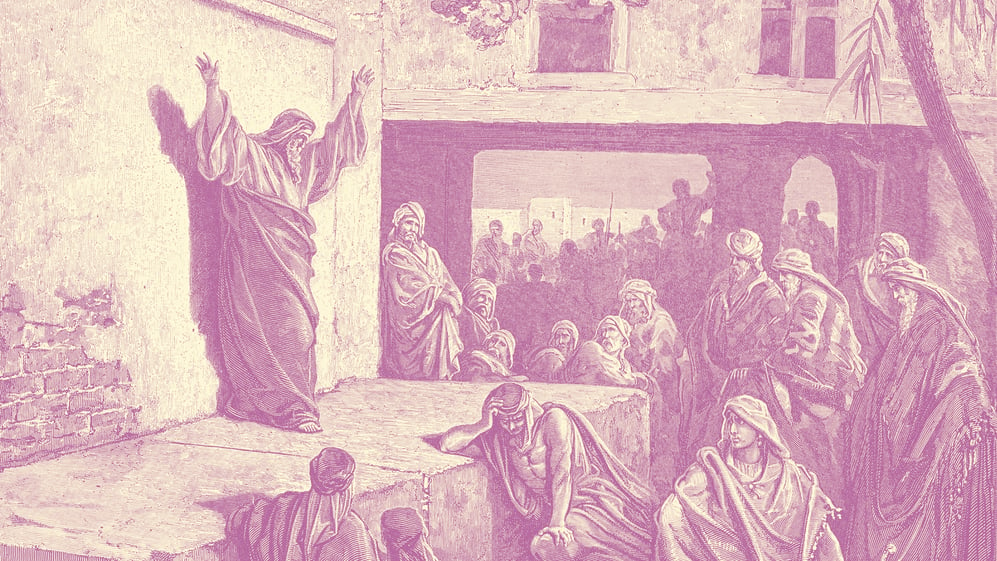This post is adapted from Luther's Works, vol. 18 (Lectures on the Minor Prophets I).
When the destruction of the Jewish people was imminent, when the new age and kingdom—namely, Christ—were coming, God sent many great prophets to cry out and lament about the coming destruction of the entire people so that at least some who heard the preaching of a threatening evil might believe, be converted, and, thus converted, be saved. In this way they might delay that terrible and wretched destruction. Thus at the same time prophesied Amos, whom I regard as the first, Hosea, who must be counted after Amos, and Micah. Isaiah also prophesied at the same time, although he would have been the last of these. Now all of them prophesied about the destruction of the old people and the bringing in of a new people, about the abolition of the external kingdom and the establishment of a new spiritual kingdom which would happen through Christ.
The Spiritual Kingdom of Christ
You see, when the physical kingdom ended, the spiritual kingdom of Christ succeeded it. It was impossible for the external kingdom of the flesh to stand along with the spiritual kingdom. Therefore the external kingdom had to be abolished, and that was accomplished by the miraculous counsel of God when He caused His people to be carried off into captivity, a people who were boasting smugly about their external kingdom and external righteousness. And yet, after the dispersion— massive though it was—God Almighty preserved for Himself a remnant of the people which He caused to be brought back from both sides—from Israel and from Judah. Of these remnants saved, nevertheless, the greater part was numbered from Judah rather than from Israel, in order that there might be some in whom this new kingdom might begin. After all, there had been a promise that Christ would be born of these people and that from them would come forth the Savior and that new Word of the new kingdom. Therefore, in order that God might stand on His promises, He saved some—although very few—among whom He might present what He had promised and might be found truthful. The prophet Micah thus was sent to declare that the destruction of the entire people was imminent. But all the prophets cried out in vain.
We Received the Gospel
Today through God we have received the sound Gospel in rich measure. We, too, must have no doubt that some great calamity and change of all things threaten. Because of His goodness, God Almighty warns us, just as He warned the Jews with many prophets and an abundance of words. He calls us to repent, but just as they held all things in great contempt, so also do we. After all, our princes rage against the Gospel and its preachers. They persecute its preachers, arrest them, throw them into prison, and kill them. Even the bishops, whose responsibility it is to promote the Gospel, persecute them very much and confirm wickedness against the Word of God. So what happened to the Jews when they despised the Word is undoubtedly going to happen also to us when we despise it.
Comparing Micah and Hosea
In general, the prophet Micah discusses the same thing in his prophecy as Hosea does in his. They both saw so many prophets and such a complete expression of the Word sent in vain, they saw so many prophets despised and, in fact, killed that they foretold that both kingdoms would be destroyed. Yet there was the clear promise of God that the kingdom of David would be an external kingdom, that no leader would be taken away from the throne of David until the Messiah would come. The promise says this openly. In appearance this certainly was contrary to the prophets, who kept threatening and prophesying that both kingdoms would be ruined. Even the wicked people of Judah kept pressing the prophets with these prophecies about the kingdom of Judah. (Our people do not have a clear word of this sort with which they could oppose the Gospel, like the Jews.) And yet God miraculously kept His promise, so that He provided both kingdoms with a very wretched destruction. But He was not unaware of His promise, for the kingdom did not disappear completely. King Jehoiachin, who was carried off to Babylon and put into prison, nevertheless was saved. He was finally honored and elevated above all the kings in Babylon, as the sacred histories have it. This flesh, however, does not notice that God thus reveals in one man what He has promised. This is God’s way.
Excerpt adapted from Luther's Works: American Edition, vol. 18 © 1975 Concordia Publishing House. All rights reserved.
Dive into the minor prophet Micah in the latest in the Concordia Commentary series.









.jpg?width=50&height=50&name=IMG_20220621_160541_456%20(1).jpg)


